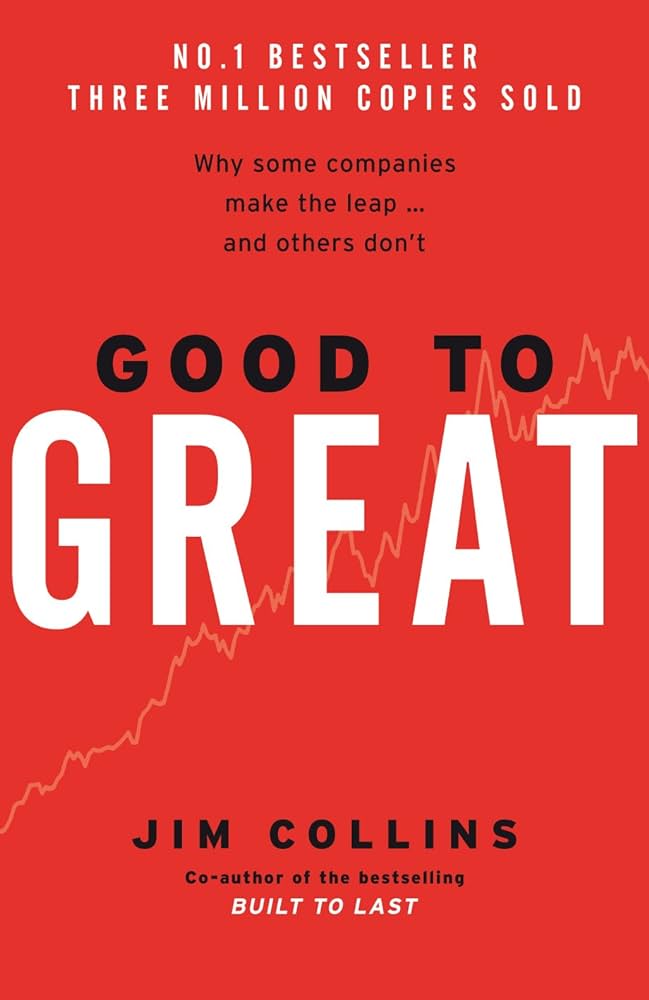TheIndianBookStore
GOOD TO GREAT by Jim Collins
GOOD TO GREAT by Jim Collins

Couldn't load pickup availability
FORMAT: PAPERBACK
Good to Why Some Companies Make the Leap... and Others Don't is a 2001 management book by James C. Collins that aims to describe how companies transition from being average companies to great companies and how companies can fail to make the transition. “Good to Great” attained long-running positions on the New York Times, Wall Street Journal and Business Week best-seller lists, sold 2.5 million hardcover copies since publication, and has been translated into 32 languages."Greatness" is defined as financial performance several multiples better than the market average over a sustained period. Collins finds the main factor for achieving the transition to be a narrow focusing of the company’s resources on their field of competence. Collins used a large team of researchers who studied "6,000 articles, generated more than 2,000 pages of interview transcripts and created 384 megabytes of computer data in a five-year project". In this book summary of "Good to Great" you can discover the condensed wisdom to be gained from the book. You can discover what differences there were in companies that managed to achieve greatness. Do you want to know the characteristics of a leader most likely to take their company from good to great? Do you want to know how to hire the right people? The book summary includes information on each of the topics covered in “Good To Great” in a format that will help you while reducing the time required for reading the entire book.Chapter Good is the Enemy of GreatChapter Level 5 Leadership Chapter First Who… Then What Chapter Confront the Brutal Facts Chapter The Hedgehog Concept Chapter A Culture of DisciplineChapter Technology AcceleratorsChapter The Flywheel and the Doom LoopChapter From Good to Great to Built to LastThe author of “Good to Great”, James C. "Jim" Collins, III is an American business consultant, author, and lecturer on the subject of company sustainability and growth. Jim Collins frequently contributes to Harvard Business Review, Business Week, Fortune and other magazines, journals, etc. Collins began his research and teaching career on the faculty at Stanford University's Graduate School of Business, where he received the Distinguished Teaching Award in 1992. In 1995, he founded a management laboratory in Boulder, Colorado, where he now conducts research and teaches executives from the corporate and social sectors.
Share

Over 75,000+ happy customers
Collapsible content
India’s Favourite Bookstore—Hear It From Fans

Amazing Quality!
""Absolutely love this store! the print quality is top-notch, and fast delivery makes it even better. 100% worth every penny!""
Arjun Mehta

1000% Worth it
""Best place to buy mangas in India! Crisp printing, vibrant colors, and perfect packaging. A must-buy for every book lover.""
Priya Nier

Perfect Quality
"The attention to detail is incredible. Mangas are great, They really cares about their customers."
Emma Davis

Outstanding Service
""Five stars! I got my favorite fantasy series and the books were in pristine condition. Definitely worth it for any serious reader.""
Neha

Best Purchase of 2025
""I’ve stopped buying from anywhere else — amazing selection, perfect packaging, and great quality. You won’t regret ordering!""
Siddharth Rao

The Whole Set is Amazing
""Finally, a bookstore that delivers exactly what it promises — high-quality, great pricings and unbeatable customer service.""
Yash Nikumbh

Paradise for anime lovers
"Got my Demon slayer manga set at great condition, loved the mangas , its totally worth buying."
Karan Patel

Loved them soo much!
"I dont give reviews too much but this is worth giving 5 starts, great quality such great Prices, thanks Indian book store."
Simran Kaur

Bought Chainsawman Book Set
"I was a bit curious about the quality but its exceeds my expectations, its very good, all the manga, the print quality, its amazing."
Saurav Suman
Frequently Asked Questions
Where is my order?
Tracking your order is super easy! Just use your mobile number on our official tracking page: https://parcelx.in/tracking.php for real-time updates. It starts showing when order gets picked up. If you ever need more help, message us anytime—your books are safely on the way and we’re always here to assist.
What payment methods do you accept?
Enjoy effortless payment flexibility: Cash on Delivery (COD), debit/credit cards, UPI, and net banking options are all supported. With COD, you only pay when your parcel reaches your door, so you can shop stress-free.
What if my order is delayed?
We’re sorry if there’s a wait—during festival rushes or heavy rains, delivery can take a little longer. Rest assured, all orders are tracked and your parcel is on its way. For updates, use our tracking page or message us and our team will resolve it promptly.
Can I return or exchange my order?
Absolutely! If you ever receive the wrong book or your order arrives damaged, just send us a photo—we’ll send you a free replacement, issue a refund, or give you a special coupon for your next order, all with zero hassle or paperwork. Shop with full confidence: your satisfaction is always 100% guaranteed!
Why should I trust your store?
We’re a verified brand with thousands of happy customers across India, transparent policies, and real social proof. Every order is tracked, and we support COD for maximum safety. Plus, our support team replies instantly to all DMs—our only mission is making reading culture big in India.

